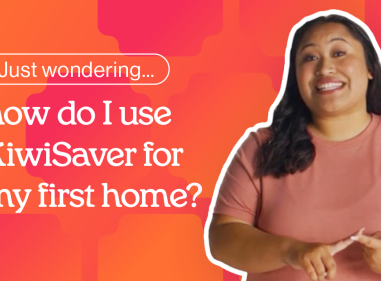
Planning & budgeting
Saving & investing
KiwiSaver
Tackling debt
Protecting wealth
Retirement
Home buying
Life events
Setting goals
Money tracking
Plan your spending with a budget
Getting advice
Studying
Get better with money
What pūtea beliefs do you have?
How to build up your emergency savings to cover unexpected costs
How to save your money
How to start investing
Find a financial adviser to help you invest
Your investment profile
Compound interest
Net worth
Types of investments
Term deposits
Bonds
Investment funds
Shares
Property investment
How KiwiSaver works and why it's worth joining
How to pick the right KiwiSaver fund
Make the most of KiwiSaver and grow your balance
How KiwiSaver can help you get into your first home
Applying for a KiwiSaver hardship withdrawal
How to use buy now pay later
What you really need to know before you use credit
How to get out of debt quickly
Credit reports
Know your rights
Pros and cons of debt consolidation
Credit cards
Car loans
Personal loans
Hire purchase
Student loans
Getting a fine
What happens if I start to struggle with moni?
How to build up your emergency savings to cover unexpected costs
Cryptocurrency
How to protect yourself from fraud and being scammed
About insurance
Insurance types
Insuring ourselves
Wills
Enduring powers of attorney
Family trusts
Insuring our homes
Losing a partner
Redundancy
Serious diagnosis
How to cope with the aftermath of fraud
Separation
About NZ Super – how much is it?
When you’re thinking of living in a retirement village
How to plan, save and invest for retirement
Manage your money in retirement
Find housing options in retirement
Four approaches to spending in retirement
Planning & budgeting
Saving & investing
How to build up your emergency savings to cover unexpected costs
How to save your money
How to start investing
Find a financial adviser to help you invest
Your investment profile
Compound interest
Net worth
Types of investments
Term deposits
Bonds
Investment funds
Shares
Property investment
View all
KiwiSaver
Tackling debt
How to use buy now pay later
What you really need to know before you use credit
How to get out of debt quickly
Credit reports
Know your rights
Pros and cons of debt consolidation
Credit cards
Car loans
Personal loans
Hire purchase
Student loans
Getting a fine
What happens if I start to struggle with moni?
View all
Protecting wealth
How to build up your emergency savings to cover unexpected costs
Cryptocurrency
How to protect yourself from fraud and being scammed
About insurance
Insurance types
Insuring ourselves
Wills
Enduring powers of attorney
Family trusts
Insuring our homes
Losing a partner
Redundancy
Serious diagnosis
How to cope with the aftermath of fraud
Separation
View all
Retirement
Home buying
Reading time: 6 minutes

The amount you can borrow for a home depends on a couple of things: how much you can afford to repay on your current income, and how much a lender will lend on a property.
Lenders want to be sure that you’ll be able to keep up with your repayments and still have enough money left over to live on. They don’t all use the same method to work this out, however.
Some say that fixed payments (mortgage repayments plus any other loan or hire purchase payments) should be no more than 30–40% of gross income.
If you know your income and what your existing fixed payments are, you can work backwards to find the level of mortgage repayment a lender will allow. Then you can experiment and see what size loan you could afford with these repayments.
It’s important to consider the impact on your ability to meet your repayments if interest rates go up. Not sure how to calculate mortgage repayments? Our mortgage calculator will help you see what the payments would be if the interest rate went up by 1%, 2% or more.
Some lenders also have calculators on their websites to give a rough idea of how much they may lend. These calculators may not take into account your current debt situation, so you’ll need to contact the bank or a mortgage broker directly to get a better indication.
Some lenders calculate a minimum amount ('minimum surplus') that we should have left over each month after fixed payments and a living allowance are deducted.
This is called ‘UMI’ (uncommitted monthly income) and varies from bank to bank.
For a couple, the calculations are based on combined income. For someone with children, lenders will expect to see less surplus.
If you’re borrowing a large amount of the purchase price, lenders will expect you to have more spare income. This is so you can deal better with any future uncertainties like a rise in interest rates or a reduction in income. For example, if someone is borrowing 95%, some banks will want to see a UMI of $750 to $1,000 a month.
Planning to get flatmates in to help pay the mortgage? Some lenders will count 70% to 80% of their rent towards your income. Other lenders won't include any.
The easiest way to find out how much you can borrow through a lender is to give them your income and spending details and ask them to make the calculation. Or, you could ask a mortgage broker to do this.
Based on the details you give them, a lender may give ‘pre-approval’ of the amount they are willing to lend. The key is to treat this as an upper limit rather than a starting point!
Generally, we can expect a lender to lend up to 80% of the value or price of a house (generally whichever is lower).
Often, lower percentages are loaned on properties outside urban areas and on apartments. These figures are sometimes called the ‘loan to value’ ratio, or ‘LVR’.
It is possible to borrow up to 95% of a property’s value in some cases. But that’s a big risk for both the borrower and the lender.
Most lenders will want you to have a cash deposit to put towards your home. People are usually more committed to keeping up repayments on a loan if some of their own money is invested in the property from the start.
Whether the cash is money saved or a gift from a family member doesn't matter to most lenders. Most won’t accept deposits raised through loans. This would raise your financial commitments and make it tougher for you to meet all your payments.
However, if you are borrowing 95% of the property’s value a bank is likely to want to see the deposit as being saved, not received as a gift.
For many of us, house prices seem to be rising faster than we can save. To help, people who can afford mortgage repayments but are unable to save the 20% deposit now required by most lenders may be eligible for a First Home Loan. The lending criteria are different to standard loans; there are income and house price limits.
For more information on how KiwiSaver can help first home buyers, visit the Kāinga Ora website.
Anyone who’s been chased by debt collectors for things like missed hire purchase payments or an unpaid power bill probably has this recorded on their credit report.
Because of this, lenders may only lend them a lower proportion of the property price, or may turn them down altogether. Someone who can’t get a loan from standard lenders may have better success with a specialist in higher-risk loans. These lenders are usually only accessible through a mortgage broker and the total cost of borrowing is likely to be higher.
Guide
Getting into a first home takes careful planning and, for most of us, serious budgeting! These tips for first home…

Guide
It can feel good being a home sweet homeowner! But – and there is “the but” – we still need…

Guide
A house is often the biggest purchase of our lives, and a mortgage (also called a home loan) is typically…

Guide
Refinancing (also called remortgaging) is a normal part of home ownership. It’s when you replace your mortgage with another in…

Guide
There are many types of mortgages, each with its own interest rate, fees and flexibility. Each of these things affect…

Video
KiwiSaver can help you save up a deposit for your first home. This free video tells what you need to…

Use verification code from your authenticator app. How to use authenticator apps.
Code is invalid. Please try again
Don't have an account? Sign up
Or log in with our social media platforms


A free account gives you your very own space where you can save your tools and track your progress as you get ahead.
Or sign up using Google:


